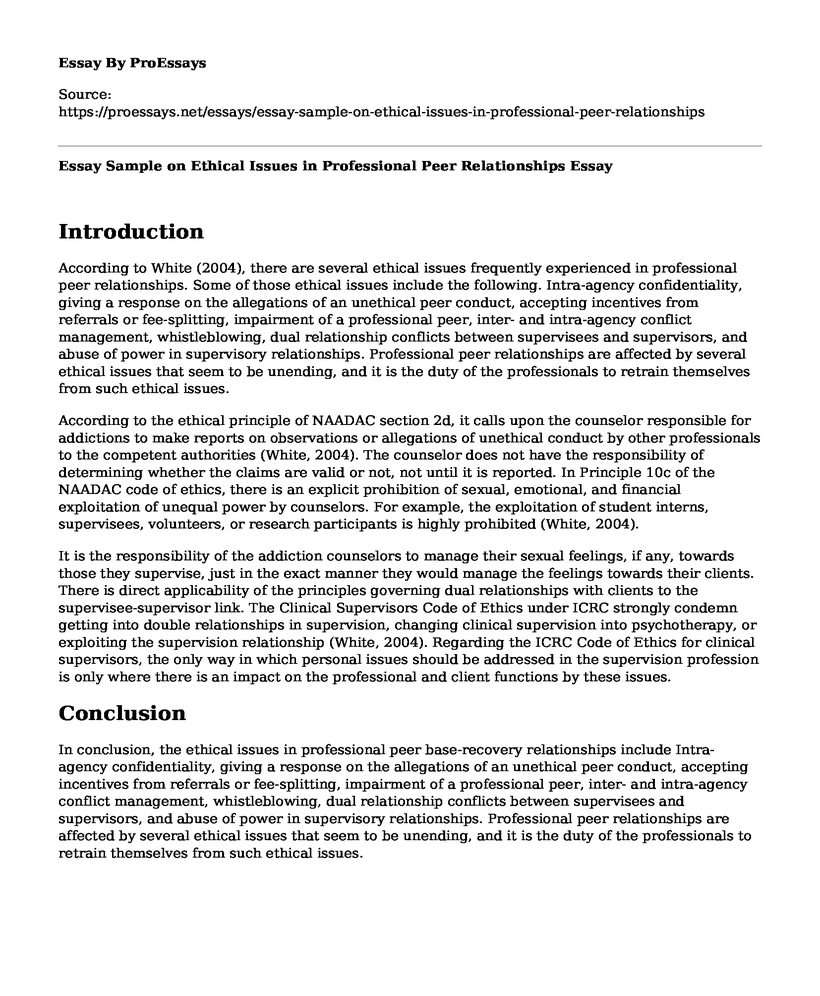Introduction
According to White (2004), there are several ethical issues frequently experienced in professional peer relationships. Some of those ethical issues include the following. Intra-agency confidentiality, giving a response on the allegations of an unethical peer conduct, accepting incentives from referrals or fee-splitting, impairment of a professional peer, inter- and intra-agency conflict management, whistleblowing, dual relationship conflicts between supervisees and supervisors, and abuse of power in supervisory relationships. Professional peer relationships are affected by several ethical issues that seem to be unending, and it is the duty of the professionals to retrain themselves from such ethical issues.
According to the ethical principle of NAADAC section 2d, it calls upon the counselor responsible for addictions to make reports on observations or allegations of unethical conduct by other professionals to the competent authorities (White, 2004). The counselor does not have the responsibility of determining whether the claims are valid or not, not until it is reported. In Principle 10c of the NAADAC code of ethics, there is an explicit prohibition of sexual, emotional, and financial exploitation of unequal power by counselors. For example, the exploitation of student interns, supervisees, volunteers, or research participants is highly prohibited (White, 2004).
It is the responsibility of the addiction counselors to manage their sexual feelings, if any, towards those they supervise, just in the exact manner they would manage the feelings towards their clients. There is direct applicability of the principles governing dual relationships with clients to the supervisee-supervisor link. The Clinical Supervisors Code of Ethics under ICRC strongly condemn getting into double relationships in supervision, changing clinical supervision into psychotherapy, or exploiting the supervision relationship (White, 2004). Regarding the ICRC Code of Ethics for clinical supervisors, the only way in which personal issues should be addressed in the supervision profession is only where there is an impact on the professional and client functions by these issues.
Conclusion
In conclusion, the ethical issues in professional peer base-recovery relationships include Intra-agency confidentiality, giving a response on the allegations of an unethical peer conduct, accepting incentives from referrals or fee-splitting, impairment of a professional peer, inter- and intra-agency conflict management, whistleblowing, dual relationship conflicts between supervisees and supervisors, and abuse of power in supervisory relationships. Professional peer relationships are affected by several ethical issues that seem to be unending, and it is the duty of the professionals to retrain themselves from such ethical issues.
Reference
White, W. L. (2004). Ethical guidelines for the delivery of peer-based recovery support services. https://scholar.google.com/scholar_url?url=http://www.m.williamwhitepapers.com/pr/2007EthicsofPeer-basedServices.pdf&hl=en&sa=T&oi=gsb-ggp&ct=res&cd=0&d=7148059359242706551&ei=TKyMXZO1Kor6mAH_oZ3AAw&scisig=AAGBfm2fcCsI9t394mLoIZcsXlS4EggbCg
Cite this page
Essay Sample on Ethical Issues in Professional Peer Relationships. (2023, Feb 17). Retrieved from https://proessays.net/essays/essay-sample-on-ethical-issues-in-professional-peer-relationships
If you are the original author of this essay and no longer wish to have it published on the ProEssays website, please click below to request its removal:
- Management of Careers and Diversity
- Essay Sample on Professionalism in School and Workplace
- Responses on Nursing Profession and Social Work
- The Social Welfare Policy Paper Example
- Three Key Learnings From Placement Experience - Essay Sample
- Essay Example on Child Behavior & Career Choice: Who Impacts More?
- Essay Example on Organizational Performance: The Impact of Work Pace







